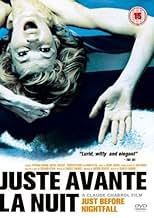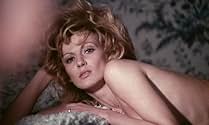IMDb-BEWERTUNG
7,2/10
2413
IHRE BEWERTUNG
Charles Masson, ein Werbefachmann, hat eine Affäre mit Laura, der Frau seines besten Freundes, des Architekten François Tellier. Charles erwürgt Laura, als eines ihrer SM-Spiele zu weit geht... Alles lesenCharles Masson, ein Werbefachmann, hat eine Affäre mit Laura, der Frau seines besten Freundes, des Architekten François Tellier. Charles erwürgt Laura, als eines ihrer SM-Spiele zu weit geht.Charles Masson, ein Werbefachmann, hat eine Affäre mit Laura, der Frau seines besten Freundes, des Architekten François Tellier. Charles erwürgt Laura, als eines ihrer SM-Spiele zu weit geht.
- Regie
- Drehbuch
- Hauptbesetzung
- 1 BAFTA Award gewonnen
- 1 Gewinn & 1 Nominierung insgesamt
Clelia Matania
- Mme Masson
- (as Clélia Matania)
Empfohlene Bewertungen
This is the most morally exquisite of Chabrol's many explorations of the human condition. Guilt, forgiveness, revenge coexist and mutually triumph. Many of us assume these three moral stances are mutually incompatible. Chabrol balances them against each other and then fuses them together. The actors reveal their inner dilemmas with gestures more than words. Deep intentions run across surface motives. And the final gesture of this compelling film casts all that went before into another, deeper level. Of course, no deed is as simple as it seems. But few appreciate as Chabrol does here that our all too common morally mixed motives can continue to coexist to the grave. No evil deed is ever straightforward, but neither are the best ones.
Had Chabrol filmed this in the style of Bergman, this film would be a Criterion Classic. But filmed as a thriller, it has sadly failed to gain the audience and admiration it so richly deserves. It is a philosophical triumph!
Had Chabrol filmed this in the style of Bergman, this film would be a Criterion Classic. But filmed as a thriller, it has sadly failed to gain the audience and admiration it so richly deserves. It is a philosophical triumph!
I love a line in this movie from the executive Masson, he said he had his house designed by a modern architect to avoid the sclerosis of becoming bourgeois. Thats exactly what I think when I see modernist furniture and architecture. It's made for future people, dysfunction-free, productive, and clairvoyant. Only that's not quite how it works out. Here we have post-bourgeois people, who find themselves, like all the best swimmers, more likely to drown. They try to reinvent morality and instead trespass into treacherous areas which the ignorant forbid themselves through superstition, in the process jettisoning the wisdom of ages.
Yes this is a Chabrol film but don't believe it's a thriller, what we have here is more along the lines of Bergman. The police in this film are portrayed as merely being obnoxious, a nuisance to everyone involved in the murder. We are constantly waiting for the detective Cavanna to disappear from the screen.
We have a view here of people whom I'm sure Matthew Barney would call almost crystalline, devoid of potentiality. The film is so awful in this respect that it almost made me glad that we only tend to live eighty years. The tired-eyed men in this movie are weighed down with disillusion and regret, waiting for the end, their successes mere dust. Just before the night, indeed. Gone are their protean days, gone are the Alpheuses of youth. It's not so much a murder thriller as an essay into death. Masson, Tellier et al would welcome the cool breeze whispering through the cypresses on the island of the dead. One startling shot from a train shows Paris in twilight, looking grubby and ready for death itself.
I think more than anything this film is about mortality. Nowhere do we see hot blood in this film, only palsy and the damp skin of the pneumonic, the husband of the mudered woman even comforts the murderer. One part of the movie that I find astonishing is when Masson sees his employee of many many years, who has just been caught embezzling by the police and is now in custody. Masson looks at him with compassion, but the old man, who is now in a sense freer than he ever has been, looks him straight in the eye and tells him to screw himself. Masks off and a bonfire of the vanities.
This film is concentrated sulphuric acid, for more of the same see Les Bonnes Femmes and Les Cousins.
Yes this is a Chabrol film but don't believe it's a thriller, what we have here is more along the lines of Bergman. The police in this film are portrayed as merely being obnoxious, a nuisance to everyone involved in the murder. We are constantly waiting for the detective Cavanna to disappear from the screen.
We have a view here of people whom I'm sure Matthew Barney would call almost crystalline, devoid of potentiality. The film is so awful in this respect that it almost made me glad that we only tend to live eighty years. The tired-eyed men in this movie are weighed down with disillusion and regret, waiting for the end, their successes mere dust. Just before the night, indeed. Gone are their protean days, gone are the Alpheuses of youth. It's not so much a murder thriller as an essay into death. Masson, Tellier et al would welcome the cool breeze whispering through the cypresses on the island of the dead. One startling shot from a train shows Paris in twilight, looking grubby and ready for death itself.
I think more than anything this film is about mortality. Nowhere do we see hot blood in this film, only palsy and the damp skin of the pneumonic, the husband of the mudered woman even comforts the murderer. One part of the movie that I find astonishing is when Masson sees his employee of many many years, who has just been caught embezzling by the police and is now in custody. Masson looks at him with compassion, but the old man, who is now in a sense freer than he ever has been, looks him straight in the eye and tells him to screw himself. Masks off and a bonfire of the vanities.
This film is concentrated sulphuric acid, for more of the same see Les Bonnes Femmes and Les Cousins.
"Just Before Nightfall" is a slow, grim, gritty, no-nonsense film. It seems as if director Claude Chabrol is saying to the viewer, "Look, don't expect to be charmed or pleased by this film -- that would be pointless for everyone. I'm interested in one thing, and one thing only: the theme of the story. Anything else would be a pointless distraction." If the viewer is willing to go along with Chabrol for the ride, Just Before Nightfall is a rich and moving film.
"Just Before Nightfall" is not a whodunnit, or even a why-dunnit. "It" -- a murder -- kind of just happened, possibly accidentally, and the question facing the characters is: what shall we do about it, now? The lead character knows he is guilty, and his desire to conceal his guilt slowly changes to a desire to confess his guilt. In this, he is like the character of Raskolnikov in Dostoevski's "Crime and Punishment". More astonishing is how his friends and family respond to his confession: they are eager to forgive and forget, to deny and bury the past. And this, in turn, creates an even worse situation for the anti-hero.
1971 was dark moment, politically and culturally. Many films of that year feel like they are suffering from a hangover from the 60s: the time of exuberant exploration and new possibilities has passed, and in its place is a cosmic-scale exhaustion and hopelessness. You see this kind of industrial-strength bleakness in US films like "Five Easy Pieces", "Carnal Knowledge", "Two-Lane Blacktop". If you enjoy 70s bleakness, or, you are interested in guilt and forgiveness, or, you want to watch a director go after his message with an intensely single-minded focus -- then "Just Before Nightfall" is well worth your time.
"Just Before Nightfall" is not a whodunnit, or even a why-dunnit. "It" -- a murder -- kind of just happened, possibly accidentally, and the question facing the characters is: what shall we do about it, now? The lead character knows he is guilty, and his desire to conceal his guilt slowly changes to a desire to confess his guilt. In this, he is like the character of Raskolnikov in Dostoevski's "Crime and Punishment". More astonishing is how his friends and family respond to his confession: they are eager to forgive and forget, to deny and bury the past. And this, in turn, creates an even worse situation for the anti-hero.
1971 was dark moment, politically and culturally. Many films of that year feel like they are suffering from a hangover from the 60s: the time of exuberant exploration and new possibilities has passed, and in its place is a cosmic-scale exhaustion and hopelessness. You see this kind of industrial-strength bleakness in US films like "Five Easy Pieces", "Carnal Knowledge", "Two-Lane Blacktop". If you enjoy 70s bleakness, or, you are interested in guilt and forgiveness, or, you want to watch a director go after his message with an intensely single-minded focus -- then "Just Before Nightfall" is well worth your time.
Fascinating view of middle class degeneracy in two married couples, with the less hypocritical paying to keep the whole facade going. Masochism, murder, desire for absolution, self-sacrifice. The acting and characterisation keep surprising. Like all Chabrol films it links to others in his filmography and will benefit from more viewings.
Possibly the best film Chabrol made, along with 'La femme Infidele' and 'Le boucher'. An intense psychological study and not really a thriller this was the first Chabrol film I ever watched. At first I was left confused and disappointed, however this powerful and moving film slowly revealed it's hidden beauty with each viewing.
This film more than any other of Chabrol's has entered my consciousness, Michael Bouquet's acting is very memorable and Stephanie Audran is astonishingly beautiful. There is no hint of mawkishness or sentimentality and one is left moved and glad of so poignant a masterpiece.
This film more than any other of Chabrol's has entered my consciousness, Michael Bouquet's acting is very memorable and Stephanie Audran is astonishingly beautiful. There is no hint of mawkishness or sentimentality and one is left moved and glad of so poignant a masterpiece.
Wusstest du schon
- WissenswertesThis is the last film of Claude Chabrol's 'Hélène cycle', in which actress Stéphane Audran starred, playing characters called Hélène in Die untreue Frau (1969), Der Schlachter (1970), and Der Riss (1970). The only film in the cycle which Audran didn't star in was Claude Chabrol´s Das Biest muss sterben (1969), the role of a character called Hélène was instead played by Caroline Cellier.
- VerbindungenVersion of Onna no naka ni iru tanin (1966)
- SoundtracksSilent Night
Original lyrics by Joseph Mohr and music by Franz Xaver Gruber, French lyrics by unknown lyricst
Played and sung in the Christmas morning scene
Top-Auswahl
Melde dich zum Bewerten an und greife auf die Watchlist für personalisierte Empfehlungen zu.
- How long is Just Before Nightfall?Powered by Alexa
Details
Zu dieser Seite beitragen
Bearbeitung vorschlagen oder fehlenden Inhalt hinzufügen

















